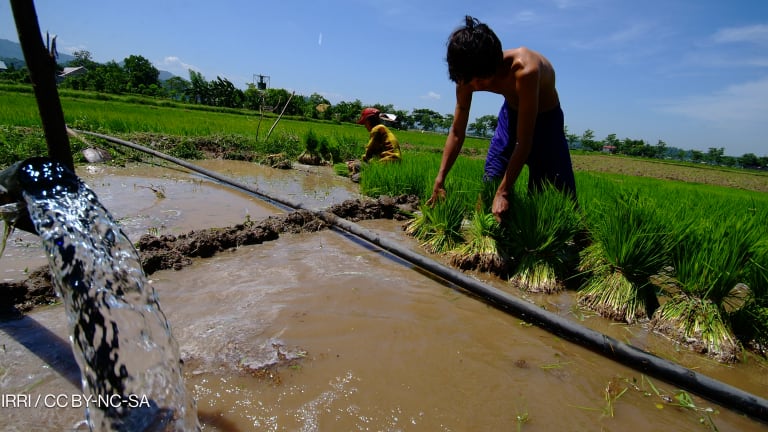
Solar-powered irrigation pumps are without a doubt one of Africa’s most promising solutions to climate change impacts and chronic hunger. As efforts to bring electricity to rural areas continue to stall and rainfall remains sporadic across much of the continent, the option of these pumps to give water to parched fields and to bolster food production is gaining momentum.
Morocco, for example, is set to install more than 100,000 solar pumps by 2020. In sub-Saharan Africa as well, major donors and development agencies have piloted and assessed solar pumping in Benin, Ethiopia, Kenya, Malawi, and Zambia, among others. Not only has the quality of solar pumps improved and the costs declined, their use can help raise farmers’ incomes and allow countries to lower carbon emissions and meet climate commitments.
Along with the promise, however, come perils. In parts of North Africa, where there is a long history of using subsidized electric and diesel pumps for irrigation, over-extraction of groundwater has become rampant. Ignoring or over-estimating the amount of groundwater available where pumps are used and the lack of incentives to use water efficiently are the chief causes. The danger with solar technology is that, by providing a steady stream of cheap power, it could make water scarcity worse, jeopardizing the livelihoods of rural communities in the long term.
Charting a course around the perfect storm
To help ensure that solar pumping initiatives fulfill their huge promise, we have devised a new set of methods that put these efforts on solid environmental and business footing. The new approach, presented in a recent journal article and research report, is critical for helping potential investors in solar pumping for Africa and elsewhere prevent a “perfect storm” of environmental and economic problems, which would thwart the development aspirations of farmers and governments.
Put it on the map
The centerpiece of the new approach is a mapping method that helps investors determine where to direct the spread of solar-powered irrigation in a given country. Previously, these decisions have been based on whether there is enough sunlight to provide solar power. In contrast, the new method relies on state-of-the-art geographic information system techniques to account for other factors, including landscape features and water availability. Assessing farmers’ ability to obtain solar technology and earn enough income to cover its costs can also be measured. The method allows users to tailor the mapping to different priorities, assigning greater importance to water availability, for example, than to accessing solar technology. The final product offers a solid guide of where solar-powered pumping is a viable option.
A first of its kind, the mapping method was devised and tested in Ethiopia and is being expanded to Ghana and Mali. The results for Ethiopia suggest that solar-powered irrigation is potentially suitable on an estimated 6.8 million hectares, offering a climate-smart alternative to fuel or electric pumps. Practicing solar pumping outside the mapped area could be risky and counterproductive. The tool can be applied in any other country in Africa or other regions, providing vital guidance for the rollout of solar pumps on a large scale.
Look out below
While helping avoid major failures, the mapping technique cannot by itself guarantee the success of solar pumping. It must go hand-in-hand with a more thorough assessment of water availability. This will need to take into account the competing uses for it — such as drinking, sanitation, and industry — to keep solar pumping for irrigation from exceeding the sustainable threshold. In order to protect water for future uses, relevant rules and legal frameworks to control and manage groundwater resources need to be followed or devised where they do not exist.
The analysis must also consider the rate at which rainfall can be expected to recharge groundwater, which is a key part of the “natural capital” on which communities in water-scarce regions of Africa and elsewhere rely. For Ethiopia, we concluded that widespread adoption of solar pumps would lead to a relatively minor increase in the use of water for irrigation, compared to the annual renewable supply.
Follow the business case
Once we know where solar-powered pumping is feasible and environmentally sustainable, the next step is to figure out how we can make it economically viable for smallholder farmers. This requires a sustainable business approach to ensure efforts do not rely entirely on donor and public funding. The challenge is to catalyze the spread of solar pumps through markets and product supply chains that offer farmers the easiest access to solar technology and the best opportunities for boosting revenues from crop production.
For Ethiopia, we identified several business options. These range from the purchase of solar pumps by individual farmers or groups, to direct financing by solar pump suppliers or investment by agribusinesses contracting farmers to grow crops. Which options best fit the conditions of a given country depend on its policies and regulations on issues such as access to credit and exemption from taxes and duties.
By creating a business case for solar-powered pumping, we can help ensure that one of Africa’s brightest climate-smart solutions does not founder from the start, but prospers and delivers benefits for millions across this continent and beyond.









